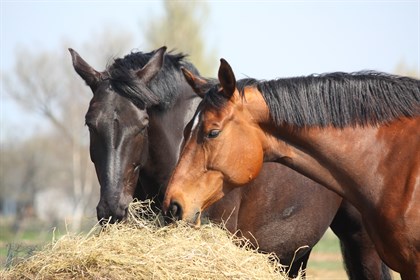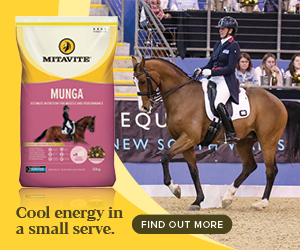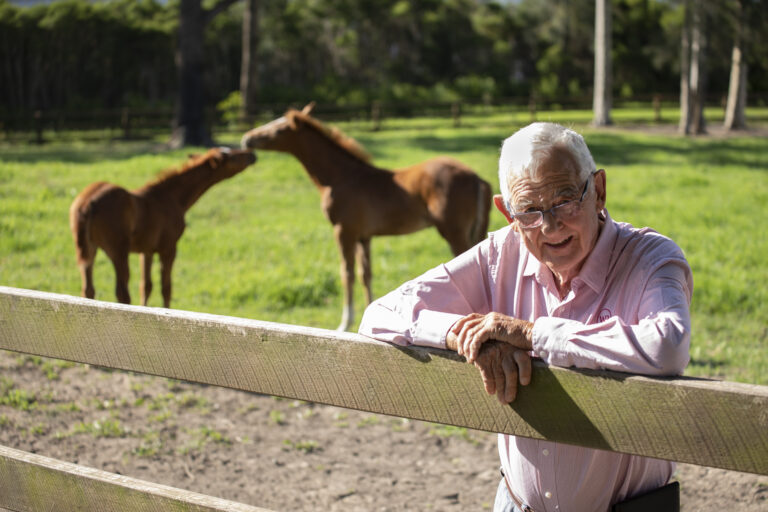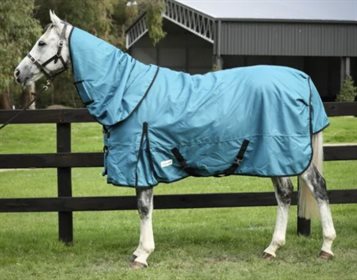Vitamin E is abundant in fresh grass but depletes quickly in preserved forages. Horses without access to green pasture may benefit from a vitamin E supplement.
Does My Horse Need a Vitamin E Supplement?
By Kentucky Equine Research Staff
Natural vitamin E is one of the crucial elements in the equine athlete’s dietary regimen. Whether a horse’s work involves eventing, endurance, trail riding, racing, or breeding, vitamin E plays a huge role in both overall health and specific performance.
Vitamin E is abundant in fresh grass, so all horses get plenty every day, right? Well, yes, except when they’re kept in a stall for many hours…or when they don’t have access to pasture…or when grass is scarce or dormant…or when they eat mostly hay, which contains lower levels of this important dietary element…or when they’re exercising intensely, in which case their requirement for antioxidants increases dramatically. As horse owners learn more about equine nutrition, they begin to see that their horses may need supplementation with a natural form of vitamin E.
Recognised as a unique nutrient less than a hundred years ago, vitamin E has many important functions in various body systems. In reproduction, vitamin E supplementation may positively influence fertility in broodmares. In addition, mares supplemented with vitamin E may demonstrate increased passive transfer of antibodies to foals. In one study, supplemented mares showed higher antibody concentrations in blood and colostrum, and their foals also had correspondingly higher levels of antibodies than the foals of unsupplemented mares. Because a very young foal’s resistance to disease depends entirely on antibodies received from its dam, this immune system support is essential to foal health in the first months of life.

As horse owners learn more about equine nutrition, they begin to see that their horses may need supplementation with a natural form of vitamin E.
Although young animals begin to produce their own antibodies as they develop, horses never outgrow their need for vitamin E. For mature horses in a schedule of training and performance, vitamin E’s role as an antioxidant is important in protecting tissues and cells from degradation by free radicals. These products of oxidation can cause irreparable damage to cell membranes throughout the horse’s body. A horse without sufficient stores of vitamin E often experiences muscle stiffness and soreness after intense exercise. A prolonged recovery period often necessitates a slowdown in the training schedule.
Even idle horses need a steady supply of vitamin E for routine tissue maintenance and healthy immune status. Horses grazing fresh pasture usually take in enough of this vital nutrient to meet day-to-day requirements, but vitamin E is quickly lost as forage becomes dormant or is dried and stored as hay. Stall-kept horses without daily access to green grass benefit from vitamin E supplementation, as do many horses during the winter months when grazing is limited or nonexistent. As research has revealed the need for a steady supply of this important vitamin, equine nutritionists have worked to discover the best way to deliver vitamin E in a stable, digestible form.
In order to understand the difficulty of this seemingly simple task, it is necessary first to realize that the term “vitamin E” actually refers to a family of substances. Among these, only two, alpha-tocopherol and gamma-tocopherol, possess the potent antioxidant properties that make the nutrient so important to the equine diet. Alpha-tocopherol is the most biologically active and is the form found most abundantly in the horse’s body.
Researchers have found supplementation with synthetic vitamin E (dl-alpha-tocopherol acetate) is the least effective in elevating plasma tocopherol levels in horses. However, primarily because of its lower cost, synthetic vitamin E is frequently added to equine feeds, even though it offers quite limited bioavailability to the horse. Such feeds can legally claim to contain vitamin E, and well-meaning owners who purchase these feeds may be mistaken about providing adequate supplementation unless they read feed product labels to differentiate between vitamin E forms. Conscientious horse owners should look for d-alpha-tocopherol (or d-alpha-tocopherol acetate) to indicate that supplemental vitamin E is derived from natural sources.
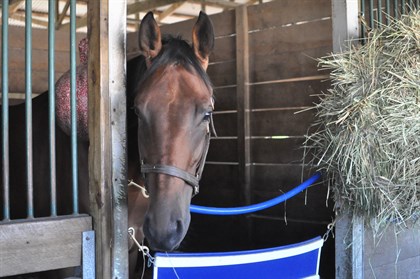
If your horse doesn’t have regular access to fresh grass, he may not be receiving enough vitamin E.
In a study conducted at Kentucky Equine Research, vitamin E plasma levels were measured in eight Thoroughbreds. All horses received the same diet and either 1,000 mg/day of synthetic vitamin E or 1,000 mg/day of the natural-source vitamin E. The results revealed that an equivalent amount of the natural-source vitamin E increased plasma vitamin E levels 56% above baseline compared to the synthetic product.
Nano-E® from Kentucky Equine Research is a natural-source vitamin E supplement that uses nanotechnology for superior bioavailability compared to synthetic and other natural vitamin E sources. Horses that might benefit from supplementation include those without access to pasture, performance horses in strenuous work, breeding horses, and those diagnosed with neurological problems such as equine motor neuron disease (EMND), shivers, or Australian stringhalt.
In July 2020, save 15% on Nano-E and other KER antioxidants when you shop on shopau.ker.com with code RECOVER715.
This article was written in conjunction with KER.
READ THE LATEST NEWS ARTICLES HERE

